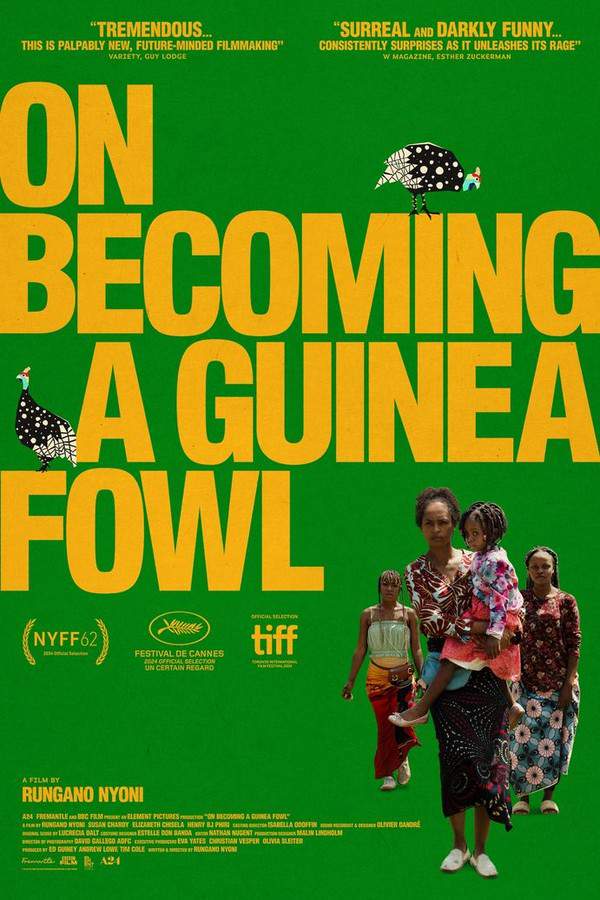What's After the Blog?
Opinions • reception
On Becoming a Guinea Fowl (2025) Review: Critics and Fan Opinions on Its Reception and Storytelling
Explore the diverse opinions surrounding 'On Becoming a Guinea Fowl', focusing on critic reviews, fan reactions, and the film's performance in storytelling and character development. Uncover the nuances of its reception within the context of the Zambian film narrative.
June 4, 2025

Movies mentioned in this article
On Becoming a Guinea Fowl: A Deep Dive into the 2025 Movie’s Reception and Audience Reactions
In recent weeks, On Becoming a Guinea Fowl has captured the attention of film critics and audiences alike since its release on March 7, 2025. Directed by the talented Rungano Nyoni, this Zambian film dives deep into themes of family secrets, cultural traditions, and the struggles faced by women in a patriarchal society. As fans flock to theaters and online platforms, we analyze and reflect on the movie’s various reviews, opinions, and overarching sentiments.
Critics’ Assessment of On Becoming a Guinea Fowl: What Experts are Saying
Critics have praised On Becoming a Guinea Fowl for its powerful storytelling and examination of familial dynamics. Austin Chronicle describes how “the quiet charisma of actress Susan Chardy subtly dominate[s] the screen” and highlights the film’s engaging narrative flow. In contrast, Arizona Republic lauds the film’s originality, stating, “it may be the most original” take on the theme of family secrets gripping audiences through grief.
Moreover, Boston Globe has crowned it “one of the year’s best films,” noting its ability to resonate with viewers as “a heartbreaking stunner that’s not easily shaken.” Critics from various outlets complement the director’s use of dark comedy, with Paste Magazine highlighting how the film “details the ways tradition is exploited and warped.” The poetic realism present in the movie is reinforced by Chicago Tribune, which calls it “a calm, visually assured statement of shared rage” that aids in reinforcing its critique of cultural traditions.
Overall, the reception from critics demonstrates a consensus that On Becoming a Guinea Fowl is a significant introspective piece, unraveling complex societal themes with beauty and insight.
Audience Reactions: Connecting With the Audience’s Raw Emotions
User reviews present a spectrum of emotions when it comes to On Becoming a Guinea Fowl. For example, user Kaffranzka describes the film as “a crescendoing howl” and appreciates how it uses “layers of absurdity, humor, and raw vulnerability” to convey powerful messages about women grappling against societal expectations. In contrast, another viewer, Brent_Marchant, noticed how the film highlights the “damning revelations” of family secrets, describing Shula’s nonchalant behavior amidst the chaotic funeral rites as both refreshing and troubling.
Critics also note the film’s ability to create a sense of discomfort. Los Angeles Times emphasizes the portrayal of “gnawing discomfort” arising from imposed secrecy about “bad men,” while The A.V. Club underscores the director’s brilliance in illustrating the contrast between chaos and solace during Uncle Fred’s funeral. This tension resonates well with audiences, who find themselves oscillating between humor and discomfort while experiencing the film.
Overall, the audience reception aligns intriguingly with critical analysis, with both groups acknowledging the film’s emotional weight and impactful narrative style.
Thematic Explorations: Family Secrets and Silent Struggles
Central to On Becoming a Guinea Fowl is the exploration of untold family secrets and the inherent struggles faced by women in a patriarchal society. The film delves into how family members, especially women, navigate the complexities of grief and shame that arise when discussing difficult topics.
User davidlovesfilm describes the film as “a gripping surrealist drama” that unearths the secrets lurking beneath surface-level family dynamics. This thematic quest is viewed through Shula’s disquieting journey of self-discovery as she grapples with her tumultuous emotions against the backdrop of a family rooted in tradition. As Shula attempts to evade the suffocating expectations of mourning, the audience bears witness to the broader implications of her actions on societal expectations and cultural constructs.
Critics also affirm this analysis, with Washington Post emphasizing the cultural portrayal of a society caught between modernity and “a crushing patriarchal hierarchy.” The juxtaposition of tradition against familial conflict resonates through On Becoming a Guinea Fowl and serves as a reflection of women’s struggles for agency in a complicated conservative environment.
Cinematic Techniques: A Masterclass in Visual Storytelling
The visual execution in On Becoming a Guinea Fowl is another aspect that has caught the attention of both critics and audiences. Utilizing a mix of dark comedic tones and surrealism, the film offers viewers an evocative experience through its cinematography. According to user jameslucas, the “ingenious cinematography” and “ambiguous flow of time work” elevate the film beyond “a simple indictment of tribal coercion.”
Critics reinforce this sentiment, with the New Yorker praising the film as “taut, absorbing, and ruthlessly concise,” while Collider notes that it is “anchored by a wonderful central performance from Susan Chardy.” The skillful techniques borrowed from horror and surrealism intensify the film’s emotional impact, guiding viewers through a wide spectrum of feelings, from laughter to discomfort, all the while maintaining the core storyline.
As one delves deeper into the cinematic techniques employed in On Becoming a Guinea Fowl, it becomes clear that the mastery of visual storytelling provides an additional framework for engaging with its complex themes and emotional depth.
Conclusion: On Becoming a Guinea Fowl Leaves an Indelible Mark on Cinema
In conclusion, On Becoming a Guinea Fowl stands as a poignant exploration of family dynamics, societal expectations, and the realities of personal identity in a complex world. The movie has garnered respect from both critics and audiences through its powerful storytelling, unique visual style, and thought-provoking themes. As we dissect the layers of this cinematic gem, it is evident that Rungano Nyoni has crafted a tale that resonates with timeless truths.
For a more in-depth exploration of On Becoming a Guinea Fowl, feel free to check out the film’s summary page on What’s After the Movie. Additionally, explore our quizzes and games related to this film here. Join us in engaging with the diverse narratives and enriching insights presented in this remarkable film, and dive deeper into the cinematic world through profiles of cast and crew, box office data, awards, and more!
| Resource | Link |
|---|---|
| Metacritic | Metacritic |
| Rotten Tomatoes | Rotten Tomatoes |
| TMDB | TMDB |
| Wikipedia | Wikipedia |
| Just Watch | JustWatch |
| Box Office Mojo | Box Office Mojo |
| Letterboxd | Letterboxd |
| Movie Insider | Movie Insider |
| IMDb | IMDb |
Continue reading

What's After the Movie?
Not sure whether to stay after the credits? Find out!
Explore Our Movie Platform
New Movie Releases (2026)
Famous Movie Actors
Top Film Production Studios
Movie Plot Summaries & Endings
Major Movie Awards & Winners
Best Concert Films & Music Documentaries
Movie Collections and Curated Lists
© 2026 What's After the Movie. All rights reserved.








